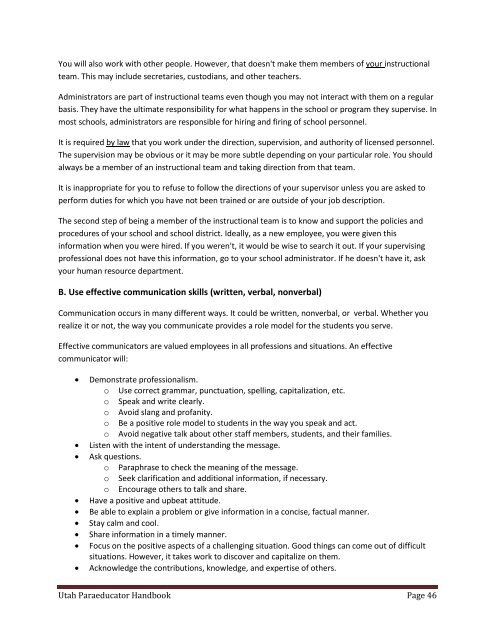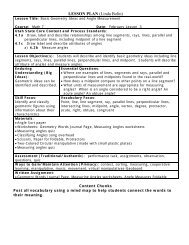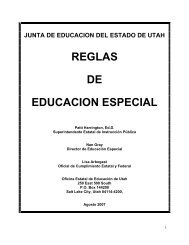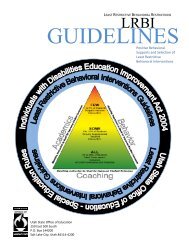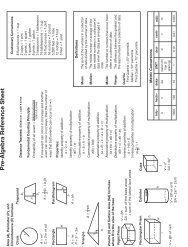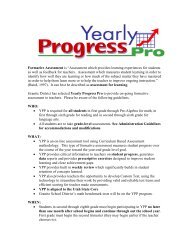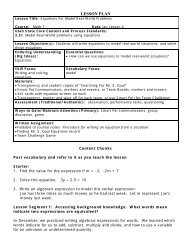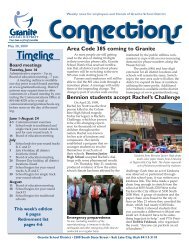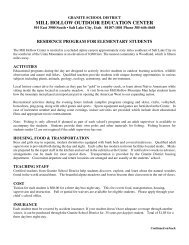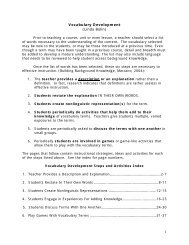Utah Special Education Paraeducator Handbook - Granite School ...
Utah Special Education Paraeducator Handbook - Granite School ...
Utah Special Education Paraeducator Handbook - Granite School ...
Create successful ePaper yourself
Turn your PDF publications into a flip-book with our unique Google optimized e-Paper software.
You will also work with other people. However, that doesn't make them members of your instructional<br />
team. This may include secretaries, custodians, and other teachers.<br />
Administrators are part of instructional teams even though you may not interact with them on a regular<br />
basis. They have the ultimate responsibility for what happens in the school or program they supervise. In<br />
most schools, administrators are responsible for hiring and firing of school personnel.<br />
It is required by law that you work under the direction, supervision, and authority of licensed personnel.<br />
The supervision may be obvious or it may be more subtle depending on your particular role. You should<br />
always be a member of an instructional team and taking direction from that team.<br />
It is inappropriate for you to refuse to follow the directions of your supervisor unless you are asked to<br />
perform duties for which you have not been trained or are outside of your job description.<br />
The second step of being a member of the instructional team is to know and support the policies and<br />
procedures of your school and school district. Ideally, as a new employee, you were given this<br />
information when you were hired. If you weren't, it would be wise to search it out. If your supervising<br />
professional does not have this information, go to your school administrator. If he doesn't have it, ask<br />
your human resource department.<br />
B. Use effective communication skills (written, verbal, nonverbal)<br />
Communication occurs in many different ways. It could be written, nonverbal, or verbal. Whether you<br />
realize it or not, the way you communicate provides a role model for the students you serve.<br />
Effective communicators are valued employees in all professions and situations. An effective<br />
communicator will:<br />
<br />
<br />
<br />
<br />
<br />
<br />
<br />
<br />
<br />
Demonstrate professionalism.<br />
o Use correct grammar, punctuation, spelling, capitalization, etc.<br />
o Speak and write clearly.<br />
o Avoid slang and profanity.<br />
o Be a positive role model to students in the way you speak and act.<br />
o Avoid negative talk about other staff members, students, and their families.<br />
Listen with the intent of understanding the message.<br />
Ask questions.<br />
o Paraphrase to check the meaning of the message.<br />
o Seek clarification and additional information, if necessary.<br />
o Encourage others to talk and share.<br />
Have a positive and upbeat attitude.<br />
Be able to explain a problem or give information in a concise, factual manner.<br />
Stay calm and cool.<br />
Share information in a timely manner.<br />
Focus on the positive aspects of a challenging situation. Good things can come out of difficult<br />
situations. However, it takes work to discover and capitalize on them.<br />
Acknowledge the contributions, knowledge, and expertise of others.<br />
<strong>Utah</strong> <strong>Paraeducator</strong> <strong>Handbook</strong> Page 46


